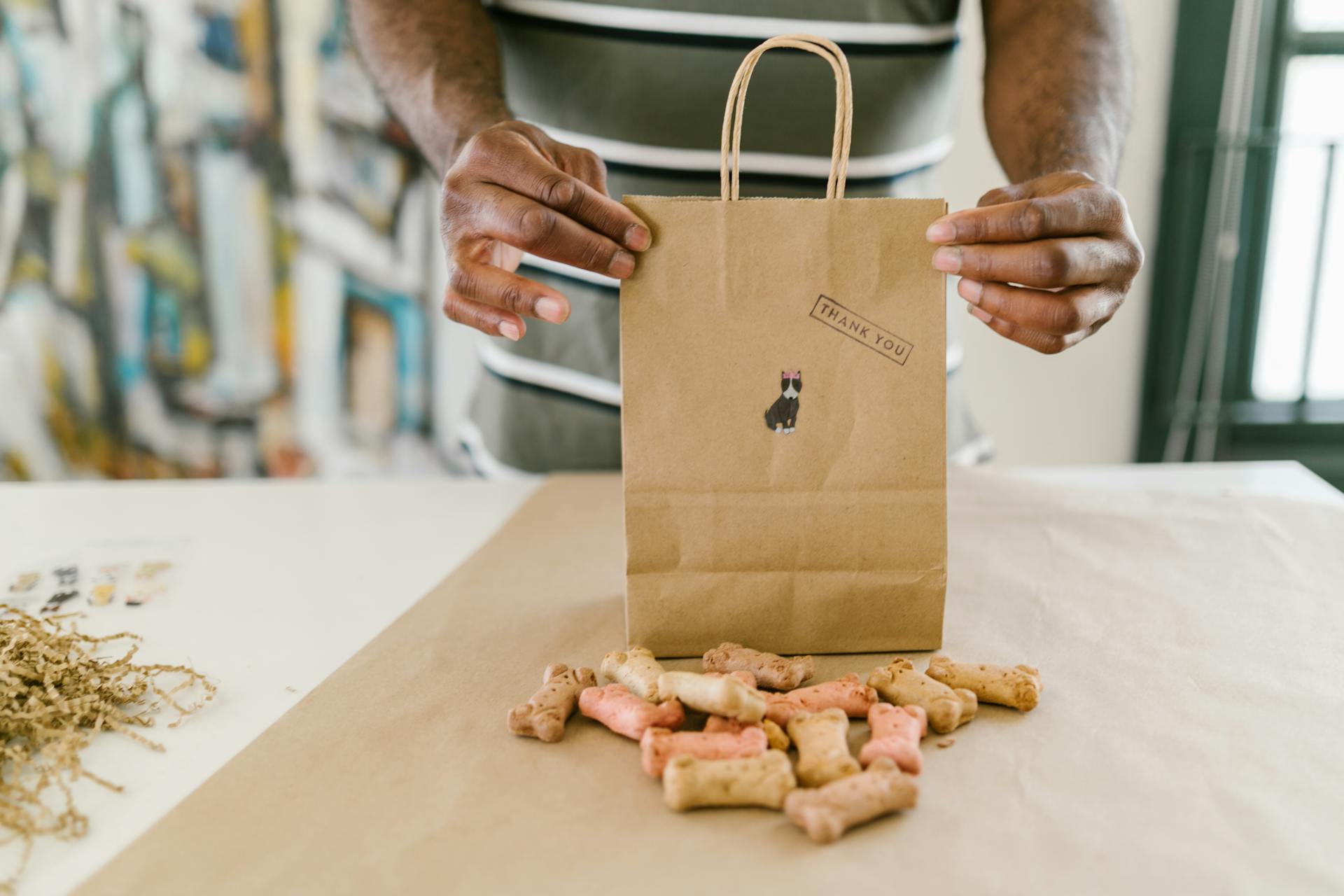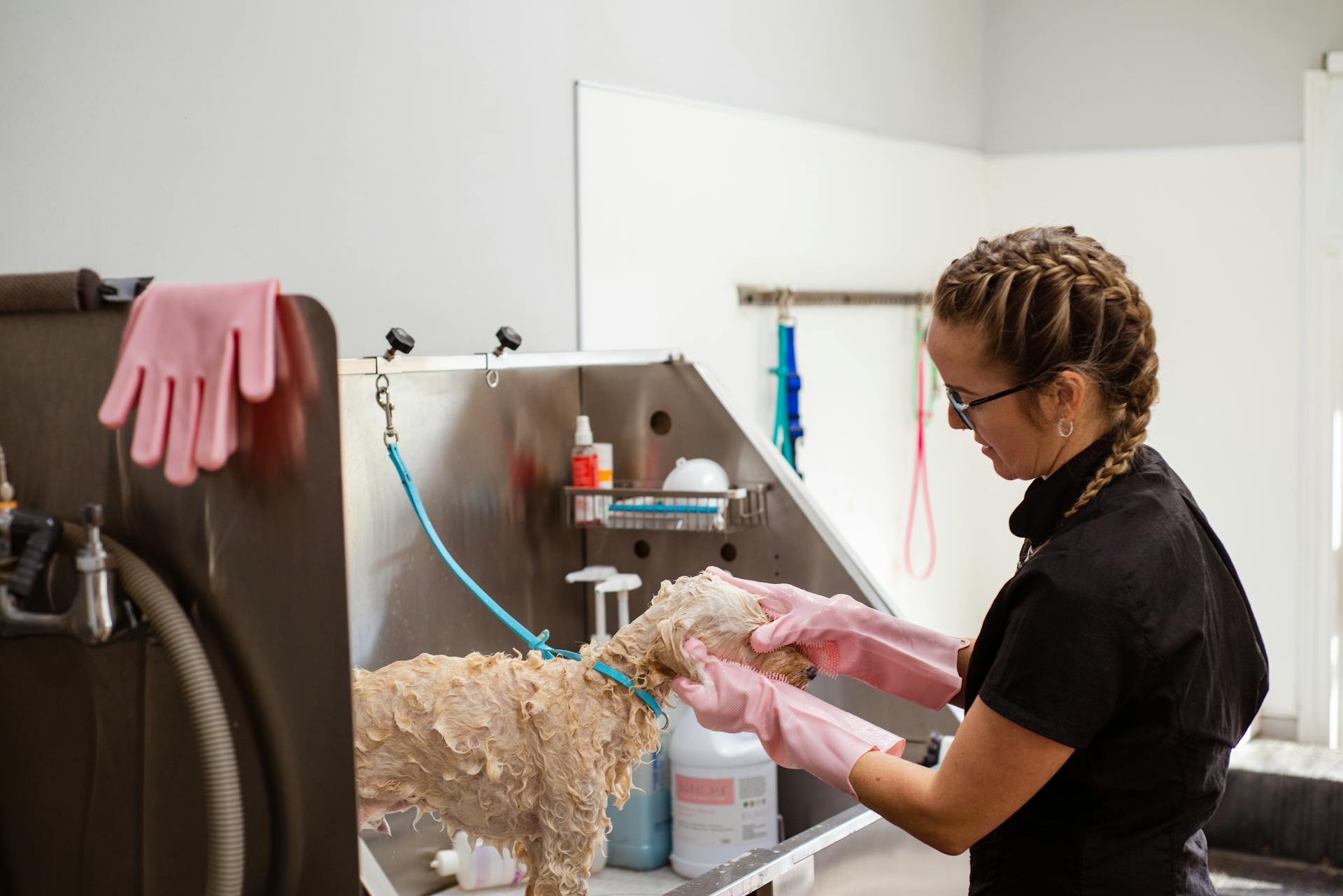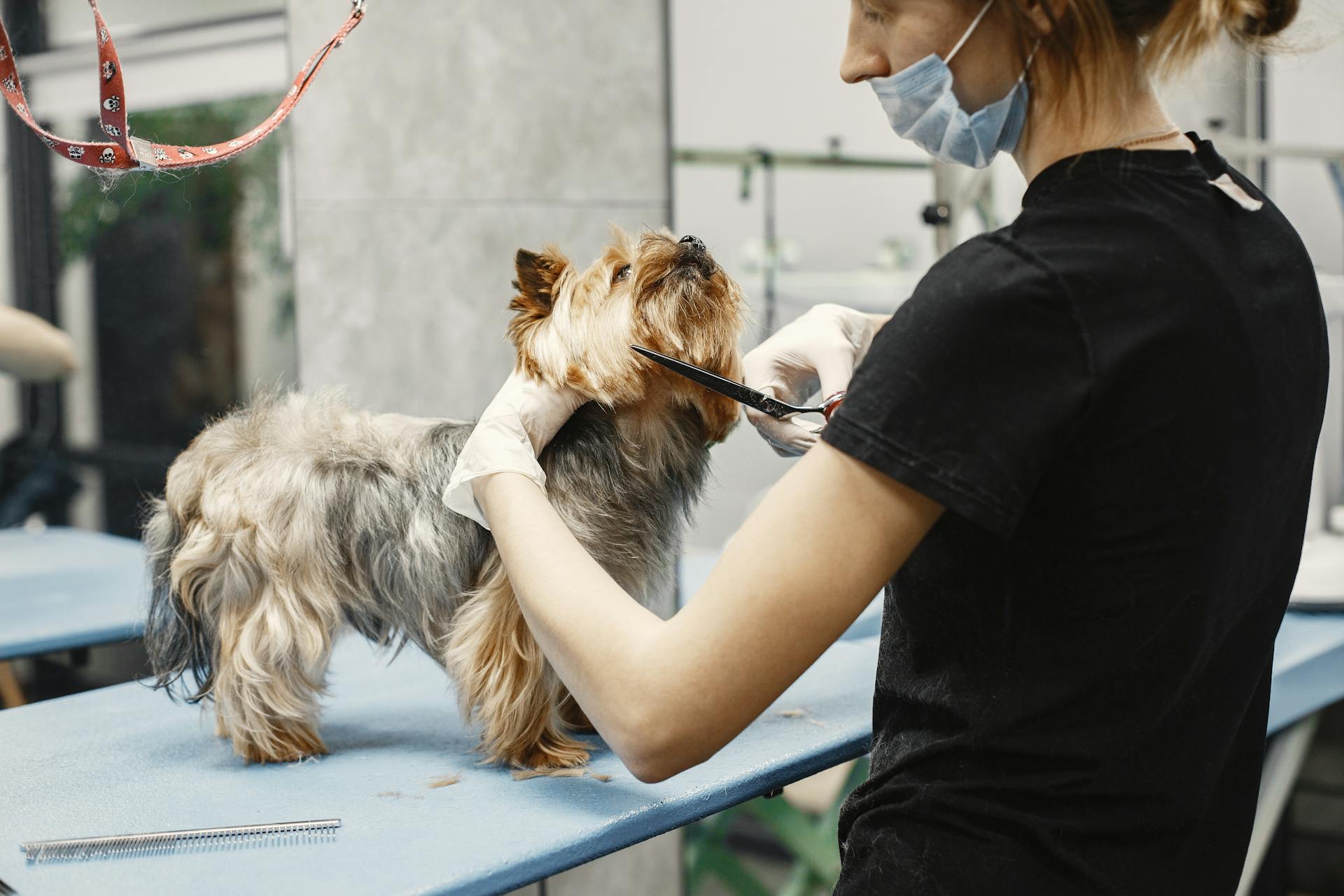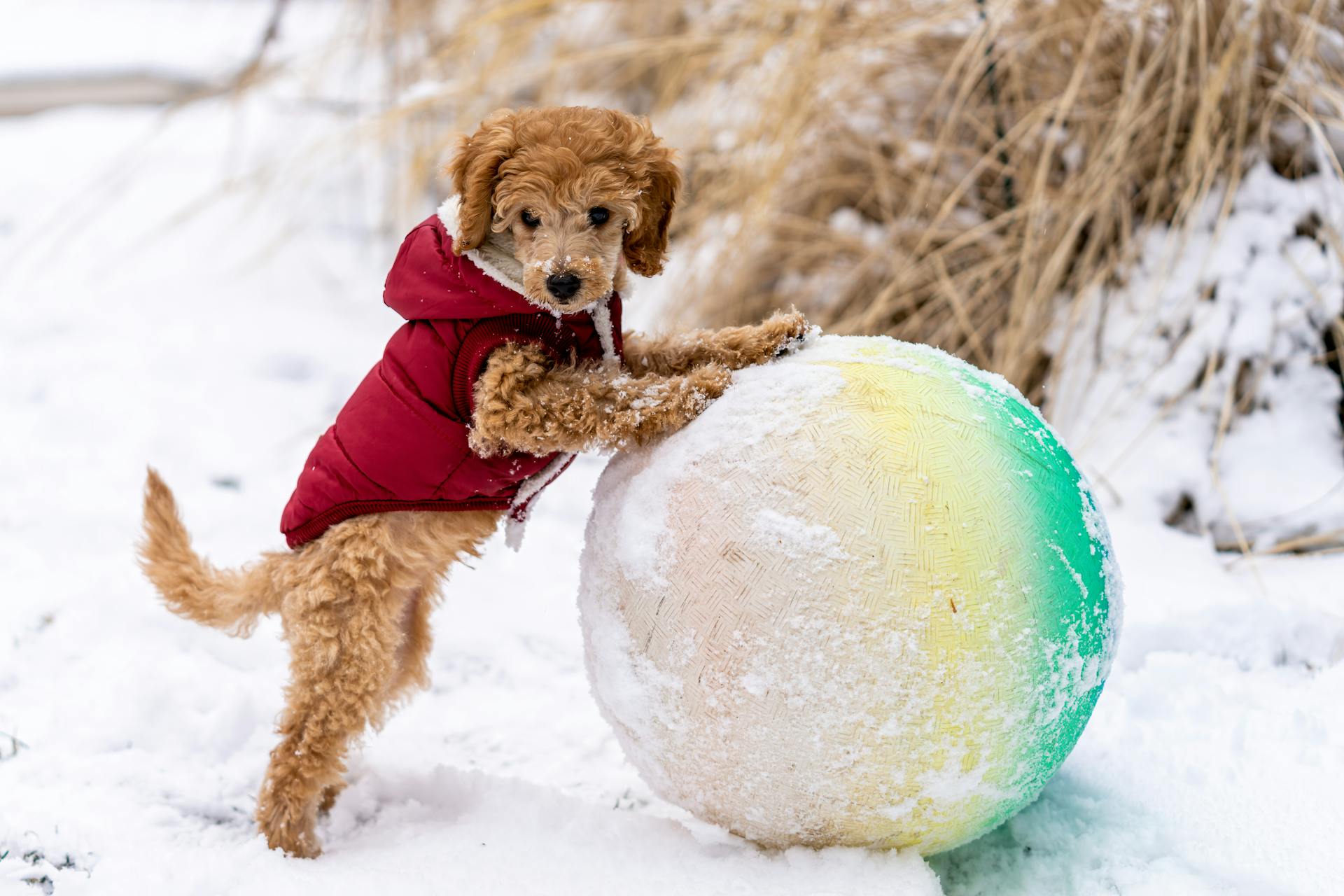
Toy Poodles are known for being intelligent and trainable, but they can be a bit finicky when it comes to housebreaking.
Their small size and high energy levels can make them prone to accidents, especially if they're not taken out frequently enough.
In fact, research suggests that Toy Poodles require more frequent potty breaks than larger breeds, with some owners reporting that their Toy Poodles need to be taken out every hour or two.
This is likely due to their small bladder size, which can make it difficult for them to hold their urine for long periods of time.
Bringing Home a New Puppy
Bringing home a new puppy can be a thrilling experience, but it's essential to prepare for the challenges that come with it. Some dogs even get car sick, so it's a good idea to bring along a helper to bring your puppy home.
Puppies can be skittish about their environment, so it's best to introduce them to new sights, sounds, and people gradually. After giving them time to toilet, introduce them to where they will be sleeping. This could be a dog bed, your bed, or a crate, so they have their own place to call home.
Dogs like repetition, so establishing a routine for eating, playing, and going potty outside is crucial. Your puppy may cry for the first couple of nights as they're not used to being away from their mom and littermates.
It's also essential to keep your dog on the same food they were on, and if you want to change it in the future, do so gradually. This will help prevent digestive issues and make the transition smoother.
Here are some tips to keep in mind when bringing home a new puppy:
- Bring a helper to bring your puppy home.
- Introduce your puppy to their sleeping area after giving them time to toilet.
- Establish a routine for eating, playing, and going potty outside.
- Keep your dog on the same food they were on.
- Get your puppy an identification tag in case they run off.
By following these tips, you'll be well on your way to creating a happy and healthy home for your new puppy.
Potty Training Basics
Potty training a toy poodle requires patience and consistency. It typically takes four to six months for a puppy to be fully house-trained, but some may take up to a year.
Young toy poodle puppies need to relieve themselves often, even as often as once an hour, due to their small bladders and fast metabolisms. Smaller breeds like toy poodles have smaller bladders, which means they need to go out more frequently.
To potty train your toy poodle effectively, utilize crate training, positive reinforcement, and consistency. Outdoor walks, puppy pads, and handling indoor accidents promptly are essential.
101
Potty training a poodle can be a challenging but rewarding experience, especially if you're consistent and patient.
It typically takes four to six months for a puppy to be fully house-trained, but some may take up to a year.
Poodles, especially young ones, need to relieve themselves frequently, often as often as once an hour.
Smaller breeds like toy poodles have smaller bladders and faster metabolisms, which means more frequent trips outside.
You'll need to establish a consistent schedule for training, taking into account your puppy's age and mental maturity.
Crate training, positive reinforcement, and consistency are key to potty training your poodle effectively.
Handling indoor accidents promptly is crucial to prevent bad habits from forming.
Outdoor walks, puppy pads, and rewarding good behavior are all essential components of successful potty training.
Stay patient and remember that every puppy is different, and it may take time for your poodle to learn.
Recognizing When Your Pet Needs to Go
Recognizing When Your Pet Needs to Go is crucial for effective potty training. You need to know the signs that indicate your pet is ready to go outside.
Toy Poodles, for example, may sniff the ground, circle, whine, or show signs of restlessness when they need to relieve themselves. These behaviors are common signals that your pet needs to go.
Young poodle puppies, especially, need to relieve themselves frequently, sometimes as often as once an hour. This is because their small bladders and fast metabolisms require more frequent trips outside.
Smaller breeds, like toy poodles, have smaller bladders and faster metabolisms which may equal more frequent trips outside. As you become more familiar with your pet's behavior, you'll be better equipped to anticipate their needs.
By recognizing these signals and taking your pet outside promptly, you can prevent accidents and make the potty training process more effective.
Explore further: At What Age Do Toy Poodles Stop Growing
Training Techniques
Consistency is key when it comes to potty training a toy poodle. You should establish a consistent schedule for training and stick to it. Young poodle puppies need to relieve themselves more often, even as often as once an hour.
To create a consistent schedule, you'll want to take your toy poodle outside every two hours during the day for potty breaks, as recommended in Example 5. This will help reinforce the desired potty behavior.
Positive reinforcement is also a crucial aspect of potty training. Praise, treats, and immediate rewards can encourage your toy poodle to go potty in the right place, as mentioned in Example 4. This will help your toy poodle understand what behavior is desired.
Potty pads can be a useful tool in some situations, but they should not be used as a substitute for eliminating outside. If you do use potty pads, designate one area of your home where your puppy can relieve itself, as suggested in Example 6.
Here are some essential tips to keep in mind when using potty pads:
- Designate one area of your home for potty pads
- Start with multiple pads and gradually reduce the number as your puppy becomes accustomed to the area
- Take your puppy to the potty pads often to help them connect the dots
Remember, patience and understanding are essential when training a toy poodle. They may not get things right the first time, or even the tenth time, so be patient and keep your training sessions short and fun.
Establishing a Routine
Establishing a routine is crucial for successful potty training a toy poodle. Consistency is key, so set a schedule for feeding, playtime, and potty breaks, and stick to it. This will help your puppy understand when it's time to go outside.
Puppies can control their bladder for about one hour per month of age, so take your toy poodle outside every 2 hours to the designated bathroom spot. A consistent routine will also help prevent accidents in the house.
Here are some essential actions to include in your routine:
Determine Your Readiness
Determine your Poodle's readiness by observing specific signs such as sniffing, circling, or heading to a designated spot before eliminating.
Typically, Poodles are ready for potty training between 12-16 weeks of age.
Younger Poodles may have less bladder control and require more frequent potty breaks.
Older Poodles, on the other hand, can hold their bladder longer and exhibit more consistent potty habits.
Understanding your Poodle's individual cues and behaviors is crucial in determining their readiness for potty training.
By paying attention to these behaviors, you can adjust your training approach based on your Poodle's readiness.
Consistency and positive reinforcement play key roles in helping your Poodle learn this important skill.
Set Up Area
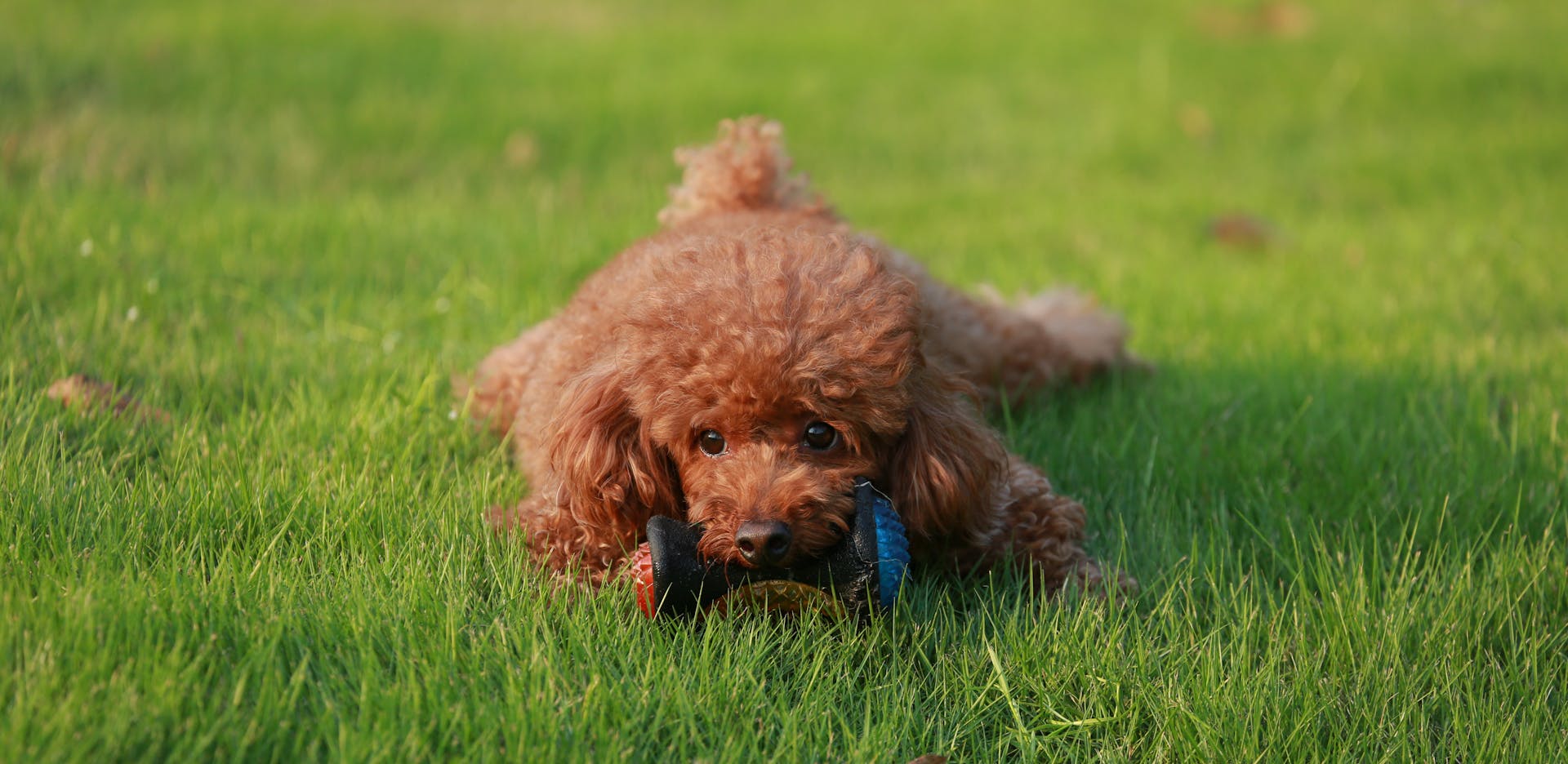
Setting up the right area for potty training is crucial for your poodle's success. A designated spot in your yard is essential for consistent potty breaks.
Choose a location that's easily accessible and away from high-traffic areas. This will help your poodle recognize it as their potty area.
Take your puppy outside to the designated bathroom spot every 2 hours, as mentioned in the action list. This will help them associate the area with going potty.
Here's a list of tips to keep in mind when setting up the potty training area:
Remember, consistency is key, so stick to the same spot every time. This will help your poodle learn quickly and make potty training a breeze.
Get Into Routine
Establishing a routine is crucial for successful potty training. A consistent schedule will help your puppy understand when it's time to go outside.
Dogs naturally need to eliminate after they've eaten a meal, so having a consistent feeding schedule can help you know when your dog will need to poop and prevent accidents in the house. You should feed your puppy as often as four times a day, depending on their age.
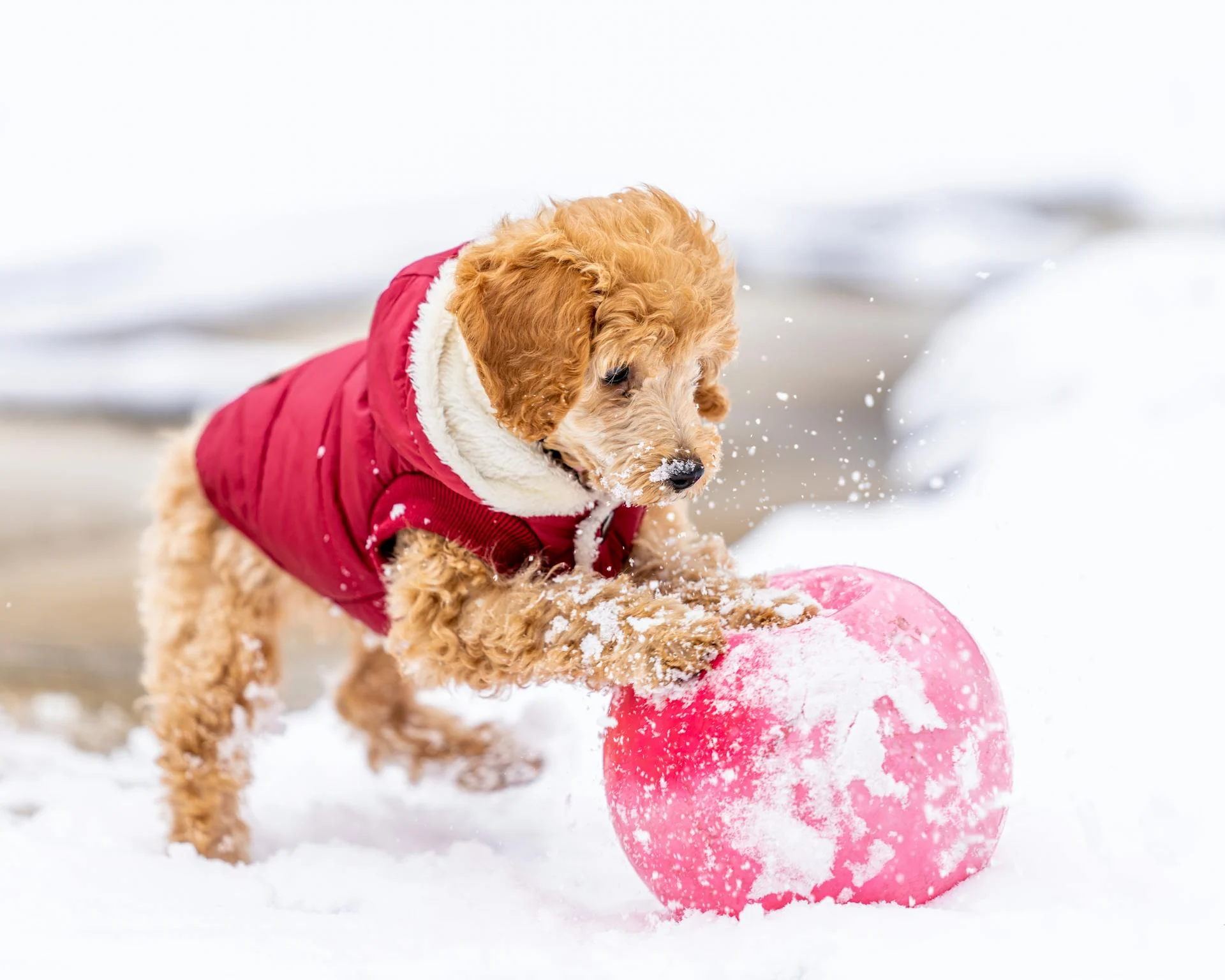
A general rule of thumb is that a puppy can control their bladder for about one hour per month of age. Take your puppy outside regularly, at least every two hours, to the designated bathroom spot. Consistency is key; always go to the same spot so your puppy associates that area with going potty.
Here are some key actions to take:
By following these steps, you'll be well on your way to establishing a routine that will help your puppy learn to go potty outside where they belong.
Managing Accidents
Managing accidents is a crucial part of potty training your Toy Poodle. Accidents are a natural part of the learning process, especially in the early stages.
Remain calm and composed in the face of accidents to ensure a positive and effective potty training experience. Accidents are bound to happen, but how you react is crucial.
Use accidents as teaching moments to redirect your Toy Poodle to the right spot. This is a great opportunity to reinforce good behavior and create a positive association with potty training.
Avoid scolding or showing frustration, as this can lead to anxiety in your Toy Poodle and potentially hinder the training process. Negative reactions can create a negative association with potty training.
Here are some tips to help you manage accidents effectively:
Cleaning up accidents promptly and thoroughly is essential to remove any residual odors that might tempt your Toy Poodle to return to the same location. By responding calmly to accidents, you create a positive learning environment without instilling a negative association with potty training.
Consistency and Positive Reinforcement
Consistency is key when it comes to potty training a Toy Poodle. Consistency is of utmost importance when potty training a Toy Poodle, their small size means they may need to go more frequently than larger breeds.
Establishing a routine is crucial, taking them out after meals, play sessions, and naps helps your Toy Poodle understand when and where they should relieve themselves, reducing the chances of indoor accidents. Consistent schedules help reinforce the potty training routine.
A consistent location in your yard designated specifically for their potty needs is essential for optimal potty training success. This spot should be used every time you take your Poodle outside to go potty, creating a clear association for your Poodle.
Positive reinforcement is a powerful tool that helps shape your Poodle's behavior and strengthens the bond between you and your furry friend. Rewarding your Poodle with treats, praise, or playtime immediately after they finish going potty in the designated spot encourages them to repeat the behavior.
Here are some key points to remember when using positive reinforcement:
- Reward your Poodle immediately after they finish going potty in the designated spot.
- Consistently reward your Poodle for going potty in the right place.
- Using treats, praise, or playtime as rewards encourages your Poodle to repeat the behavior of going potty outside.
- Positive reinforcement techniques help reinforce good behavior, making potty training a more positive experience for both you and your Poodle.
Consistency and positive reinforcement are key in successfully potty training your Poodle. By following these tips, you can make the training process a positive and enjoyable experience for both you and your Poodle.
Common Challenges
Potty training a Toy Poodle can be a bit challenging due to their small bladder, requiring more frequent potty breaks. Their keen intelligence can sometimes lead to stubbornness if not guided correctly.
Their small stature and delicate build mean they have a smaller bladder, necessitating more potty breaks. This can be a challenge for new owners, but with patience and consistency, it's manageable.
Some common challenges that can arise during potty training include inconsistency, overlooking signals, delayed rewards, and neglecting cleanup. These mistakes can confuse your Toy Poodle and lead to accidents.
Here are some common mistakes and their solutions:
- Inconsistency: Changing routines or potty spots can confuse your Toy Poodle. Maintain a consistent schedule and location.
- Overlooking Signals: Missing or ignoring your Toy Poodle’s signals can lead to accidents. Stay attentive to their cues.
- Delayed Rewards: Rewarding your Toy Poodle long after they’ve done their business can lead to confusion. Always provide immediate positive reinforcement.
- Neglecting Cleanup: Not cleaning up accidents thoroughly can lead to repeat offenses in the same area.
Introduction to Challenges
Small stature and delicate build can make potty training a bit challenging for Toy Poodles. Their small bladder means they need more frequent potty breaks.
Their keen intelligence can sometimes lead to stubbornness if not guided correctly. This is because they are known for their sharp intelligence and playful nature.
Recognizing their unique temperament is crucial for a successful potty training experience. Being patient is also essential to help them learn and grow.
Common Mistakes to Avoid
As you navigate the world of potty training, it's essential to be aware of the common mistakes that can hinder progress. Inconsistency in routines or potty spots can confuse your Toy Poodle, so stick to a consistent schedule and location.
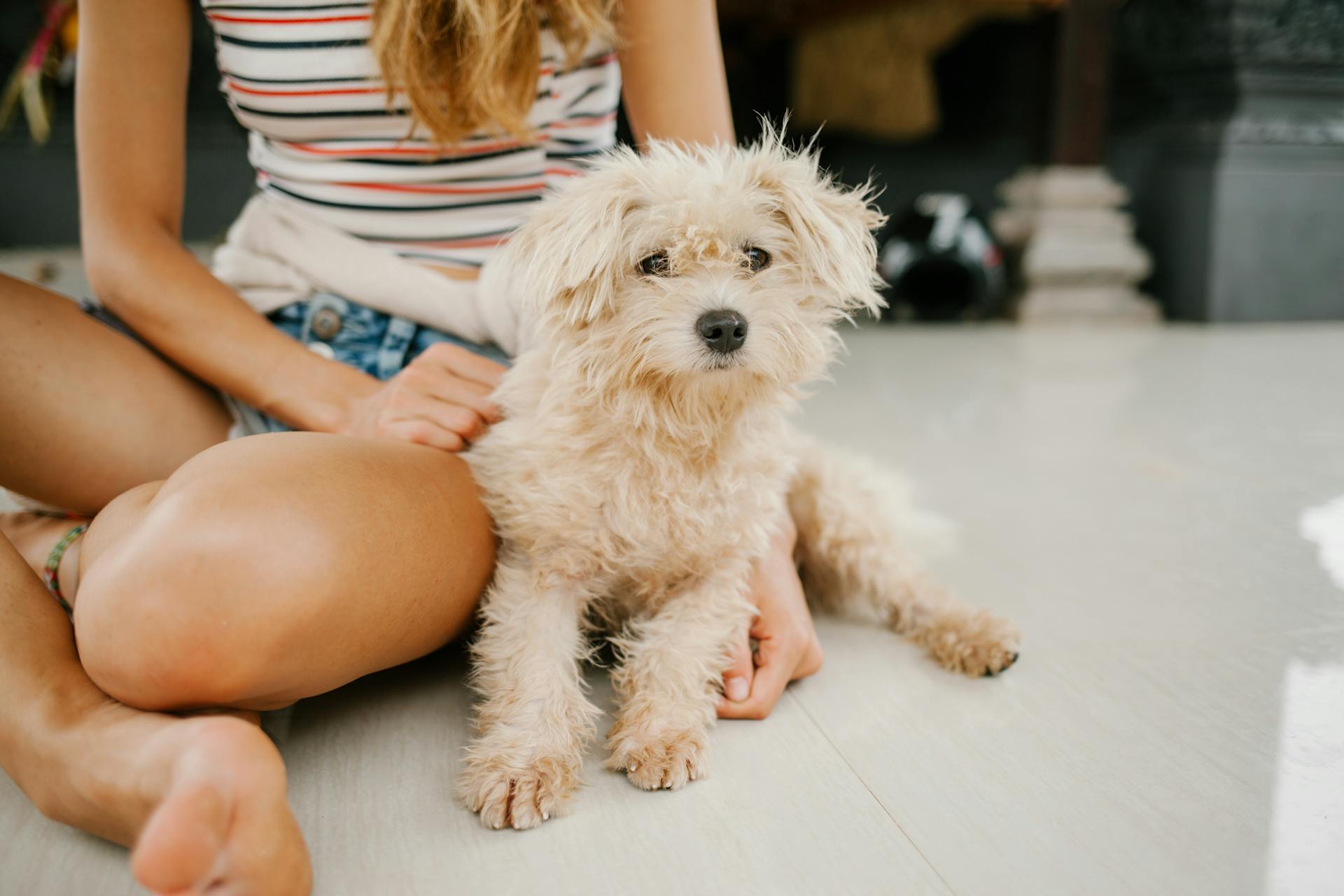
Changing your Toy Poodle's potty spot can be a major setback. Missing or ignoring their signals can also lead to accidents, so stay attentive to their cues. You might be surprised at how quickly they'll learn to communicate their needs.
Delayed rewards can cause confusion and undermine the training process. Providing immediate positive reinforcement is crucial, so be sure to reward your Toy Poodle as soon as they do their business.
Cleaning up accidents thoroughly is also important, as neglecting to do so can lead to repeat offenses in the same area. Don't let accidents become a habit – clean up quickly and move on.
Here are some common mistakes to watch out for:
- Inconsistency in routines or potty spots
- Missing or ignoring your Toy Poodle's signals
- Delayed rewards
- Neglecting to clean up accidents thoroughly
Nighttime Strategies
Limiting your Toy Poodle's water intake before bedtime can make a big difference in reducing nighttime accidents during the potty training process. This is because a full bladder can make it more difficult for your Poodle to hold it in until morning.
Taking your Toy Poodle out for a final potty break right before bedtime is also crucial. This helps minimize accidents and gives your Poodle one last chance to go before bed.
As your Toy Poodle's bladder control improves, you can gradually increase the time between nighttime potty breaks. This will help your Poodle learn to hold it in for longer periods of time.
Establishing a consistent bedtime routine is also essential. This signals to your Poodle that it's time to sleep, making potty training easier.
Here are some key nighttime potty training strategies to keep in mind:
Health and Development
Toy Poodles are known to be highly impressionable during their puppy stage, typically lasting until they are about six months old. This makes it an excellent time to start basic obedience training.
Puppies need plenty of sleep to support their rapid growth and development, so be sure to establish a regular sleep routine. Short training sessions are also recommended, as puppies have short attention spans.
Suggestion: How to Potty Train Maltese Dogs
The adolescent stage, which begins around six months and lasts until the Toy Poodle is about a year old, is often characterized by a surge in energy and a desire for independence. Consistent, positive reinforcement training is crucial during this time.
As Toy Poodles mature into adulthood, they become calmer and less energetic, typically around one year of age. Regular mental and physical stimulation is still essential to keep them happy and healthy.
Regular vet check-ups are also essential during the adult stage to monitor their health. Every dog is unique, and the exact timing and characteristics of these stages may vary.
Puppy Development
Puppy development is a critical phase in a Toy Poodle's life, typically lasting until they are about six months old. During this time, puppies are very curious and eager to explore their surroundings.
Puppies have short attention spans, so training sessions should be short and fun. This is an excellent time to start basic obedience training, as they are highly impressionable. Puppies also need plenty of sleep to support their rapid growth and development.
Understanding the puppy stage can help you prepare for the challenges of potty training, which can be a bit more difficult due to their small size and fast metabolism.
A Puppy
Puppies are more receptive to learning and can absorb new information quickly, making early training a great opportunity to teach them good behavior.
Training a puppy as early as possible, ideally when they're still a puppy, is crucial for building a strong bond with your pet and preventing behavioral problems.
Consistency is key when it comes to potty training your puppy, so establish a regular bathroom schedule and stick to it.
Positive reinforcement, such as treats and praise, can be very effective in potty training a puppy, making it a great way to encourage good behavior.
Puppies, like toy poodles, can be a bit more difficult to potty train due to their small size and fast metabolism, which can lead to more frequent bathroom needs.
Choosing a crate size that works for your puppy is essential, as it should have just enough room for them to stand, turn around, and lay down.
Offering lots of praise and rewards for a job well done is crucial for successful crate training and potty training, helping to build a strong bond with your puppy.
Here's an interesting read: Great Pyrenees Potty Training
Toy Development Stages
Toy Poodles go through several developmental stages as they grow, just like humans do. Each stage is unique and comes with its own set of characteristics and behaviors.
Puppies are very curious and eager to explore their surroundings, typically lasting until they are about six months old. They have short attention spans, so training sessions should be short and fun.
The adolescent stage typically begins around six months and lasts until the Toy Poodle is about a year old. During this time, they may start to test boundaries, so consistent, positive reinforcement training is crucial.
Adult Toy Poodles are usually calmer and less energetic than their younger counterparts, beginning around one year of age and lasting for the rest of their life. They still require regular mental and physical stimulation to keep them happy and healthy.
Frequently Asked Questions
How long does it take to toilet train a toy poodle?
House training a toy poodle typically takes 4-6 months with consistent effort, but most puppies can learn to go potty outside within a few weeks. With patience and dedication, you can help your toy poodle become a well-trained companion.
Do Toy Poodles pee in the house?
Housebreaking issues in Toy Poodles are not always the cause of indoor accidents; territorial marking is a common reason, affecting dogs of all ages and genders
Featured Images: pexels.com
